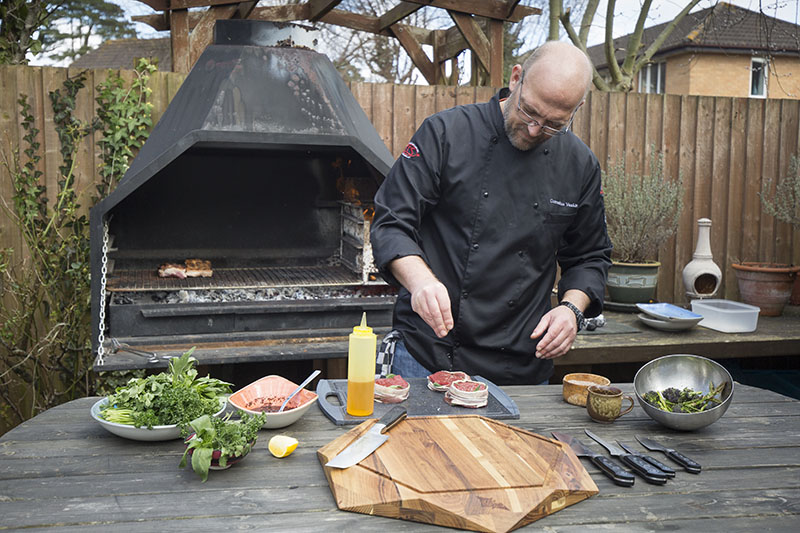
Make the most of your barbecue range
With consumers’ tastes constantly evolving, the British barbecue is becoming more than just burgers and sausages on a grill – here’s how wholesalers can stay on trend
The British barbecue might be a summertime institution, but it’s not immune from feeling the bite of modern trends.
For decades, the humble burger and sausage were enough to satisfy a hungry crowd on a sunny day, although the recent surge in experiential eating has left people clamouring for a bigger and more diverse menu – particularly when they visit restaurants or attend events.
That’s where barbecue chef Cornelius Veakins comes in, as one of several grill masters who works with top foodservice clients across the nation to make sure they’re dishing up the right barbecue grub.
“There’s something about a barbecue that brings out your inner caveman,” the South African chef explains. “It’s showing the industry that anybody can do burgers and sausages, but by taking the best of wood fire and smoke, you can create some
fantastic dishes you wouldn’t expect from
a traditional barbecue.”
For wholesalers, that means broadening their horizons too. While a strong barbecue range still needs to offer the classic products from years gone by, including a host of alternatives – focusing on quality and variety – will provide customers with what they need to create a must-eat menu.
“It’s a very competitive market, whether you’re a restaurant chain, independent or foodservice supplier, so it’s all about identifying the next trend that’s going to get people excited,” Veakins continues.
“If I’m going to go out and spend my hard-earned money at a restaurant or pub that’s doing barbecue food, I want to experience something that is amazing. If all I’m getting is something I can do at home, why would I spend there?”

HIGH VARIETY IS KEY
When it comes to extending your barbecue offering in the depot, that means providing not only more varied meat options, but also ingredients to create mouth-watering vegetarian and seafood alternatives.
With more people turning to meat-free diets (veganism has grown by 360% in the past decade according to a 2016 poll carried out by Ipsos MORI), both retail and foodservice customers will be looking for a wider variety of barbecue foods.
“People don’t normally associate barbecues with vegetarians or vegans, but from a commercial perspective, it would be insane to ignore that market,” says Veakins.
“From a foodservice point of view, offering a menu that caters to everybody means that, statistically, more people will come through the door. If you can’t cater for everybody, they will find somewhere else to eat and that’s money out of pockets along the supply chain.”
For Veakins, that means using products that aren’t traditionally associated with barbecues: cooking beetroot among the coals for 20 minutes, and using vegetables, such as broccoli, asparagus and cauliflower, that lend themselves to fire cooking.
Seafood is also a good option to stock, with high-quality prawns, salmon and other fillets providing a tasty alternative that entices both meat eaters and a lot of
vegetarians. Flagging this to customers as barbecue fare, alongside additional meats – including pork, beef steaks and chicken – could be a winner. Veakins adds, “If all you offer is meat, you’re limiting yourself from a large customer base, which is the last thing you should do.”

THERE’S NO SUBSTITUTE FOR QUALITY
“The quality of the products you use is fundamental,” Veakins says. “For example, if you’re putting rubbish meat on a barbecue, it’ll be improved, but it still won’t taste great because the raw ingredients aren’t good.”
And with palates in the UK becoming more refined, this is bad news for wholesalers if your products are focused too strongly towards value rather than quality. If feedback on food bought from your depots is poor, then customers will start looking elsewhere.
That’s not to say that bottom line isn’t important but, according to Veakins, it’s no good for anybody in the long run to churn out sub-standard products and ingredients.
“The UK is a foodie nation now and we’re very demanding in the food that we expect,” he explains. “The onus is on suppliers, wholesalers and foodservice providers to step up. If you want somebody’s money, you need to offer a good product in return. Conversely, if you give people what they want, they’ll keep coming back and spread the word.”

GRAB A PIZZA THE ACTION
The grill has always traditionally been the focus of any barbecue, but a growth in the wood-fired pizza market is seeing rustic, hand-made pizzas appearing on more menus too. According to a survey carried out by TechNavio, the commercial wood-fired pizza ovens market is going to increase by almost 5% until 2021 and while that statistic isn’t just outdoor kit for barbecues, it highlights the importance of stocking pizza ingredients.
Veakins is a fan of preparing his own pizzas, although pre-made varieties can also be pepped up by a smoky flavour.
“Wood-fired pizzas carry that extra flavour and taste better than gas in my mind,” Veakins tells Wholesale News.
“Each wood-fired pizza is unique to that second because of the time it’s been cooked for, so gives the customer more. Quality pizza ingredients don’t have to break the bank either, so from a commercial perspective that’s good for wholesalers and chefs.”
The chef believes that the growth in ovens being purchased shows wholesalers should consider stocking more than just food.
“Wholesalers should delve into selling kit, as well as ingredients,” Veakins adds. “They have such a big client base that they should look at creating an equipment-style offering for their customers too.”
DON’T FORGET THE CLASSICS
Trends might be showing that people want more than simply burgers and sausages from a barbecue, but it doesn’t mean that you should turn your back on them.
The staples are the most-bought ingredients by consumers when they’re throwing a barbecue, although people are gravitating towards premium options instead.
“There is a place for sausages and burgers, but the mentality towards food in the UK has changed compared to, say, the 80s,” he says.
“The UK’s attitude towards food has changed dramatically and we’re a foodie nation now. You can buy a burger from anywhere, but if it’s bad, you probably won’t go back. There’s buying shop-bought, pre-made burgers, but buying ingredients from a wholesaler is a game changer.”
To find out more about Cornelius Veakins and what he can do for your business, visit ourdoorbbqchef.co.uk
barbecue British barbecue week burgers Cornelius Veakins food trends grill meat sausages seafood vegetables